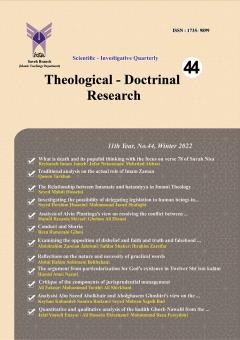-
-
List of Articles
-
Open Access Article
1 - What is death and its populist thinking with the focus on verse 78 of Surah Nisa
Reihaneh Emamjomeh Jafar nekoonam Mehrdad Abbasi -
Open Access Article
2 - Traditional analysis on the actual role of Imam Zaman
Qasem Tarkhan -
Open Access Article
3 - The Relationship between Imamate and Khatamiyya in Imami Theology
seyedmahdi hosseini -
Open Access Article
4 - Investigating the possibility of delegating legislation to human beings in the Islamic government; Looking at the constitutional events
Sayed ebrahim hosseni Mohammad javad shafaghi -
Open Access Article
5 - Analysis of Alvin Plantinga's view on resolving the conflict between science and religion
Hamid Rezania Shirazi Gholam Ali Ehsani -
Open Access Article
6 - Conduct and Sharia
رضا رمضانی گیلانی -
Open Access Article
7 - Examining the opposition of disbelief and faith and truth and falsehood and their consequences based on allegorical similes of Quranic verses
Abdolrahim Zareian Jahromi Safdar Shaker Ibrahim Zareifar -
Open Access Article
8 - Reflections on the nature and necessity of practical words
عبدالرحیم سلیمانی بهبهانی -
Open Access Article
9 - The argument from particularization for God’s existence in Twelver Shīʿism kalām
Hamid Ataei Nazari -
Open Access Article
10 - Critique of the components of jurisprudential management
Ali Fakoor Mohammad Torabi Mohammad Shirkhani -
Open Access Article
11 - Analysisi Abu Saeed Abolkhair and Abolghasem Ghoshiri's view on the components of mystical education
Keyhan Kohandel Samira Rostami seyed mohsen sajedirad -
Open Access Article
12 - Quantitative and qualitative analysis of the hadith Ghorb Nawafil from the perspective of Muslim mystics
jalal usofi enayat ali hosein ehteshami mohammadreza fereydooni
-
The rights to this website are owned by the Raimag Press Management System.
Copyright © 2017-2026







